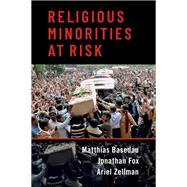- ISBN: 9780197693940 | 0197693946
- Cover: Hardcover
- Copyright: 8/4/2023
To what extent do minority grievances contribute to intrastate conflict? Against the backdrop of rising discrimination against religious minorities worldwide, Religious Minorities at Risk offers new insights into classic debates on the influences of discrimination, deprivation, and inequality (DDI) on minority grievances and conflict behavior. It does so by utilizing original data on 771 religious minorities in 183 countries between 2000 and 2014. The book demonstrates that DDI is a significant cause of minority grievances which, in turn, deeply influence their conflict behaviors.
It also shows the different effects of governmental and societal religious discrimination versus political and economic and marginalization. Religious, political, and economic grievances each escalate conflict intensity by aggrieved minorities in different ways. Ultimately, the book shows that collective grievances remain a powerful explanation for minorities' conflict behaviors; although influenced by DDI, they are not reducible to them. Second, while religious factors, including religious discrimination and grievances, uniquely contribute to minority conflict behavior, the overall patterns observed for religious minorities closely mirror those typically theorized for other minority groups. Finally, minority conflict intensity reflects the difficulties states encounter in accommodating them. Whereas religious grievances are relatively easily accommodated and therefore rarely escalate beyond rioting, political grievances influence a wider range, from non-violent protest to violence against civilians. Economic grievances, which demand costly systemic reforms, more often escalate to rebellion. An essential work on the causes of intercommunal and intrastate conflict, this will assist policymakers dealing with these issues.
It also shows the different effects of governmental and societal religious discrimination versus political and economic and marginalization. Religious, political, and economic grievances each escalate conflict intensity by aggrieved minorities in different ways. Ultimately, the book shows that collective grievances remain a powerful explanation for minorities' conflict behaviors; although influenced by DDI, they are not reducible to them. Second, while religious factors, including religious discrimination and grievances, uniquely contribute to minority conflict behavior, the overall patterns observed for religious minorities closely mirror those typically theorized for other minority groups. Finally, minority conflict intensity reflects the difficulties states encounter in accommodating them. Whereas religious grievances are relatively easily accommodated and therefore rarely escalate beyond rioting, political grievances influence a wider range, from non-violent protest to violence against civilians. Economic grievances, which demand costly systemic reforms, more often escalate to rebellion. An essential work on the causes of intercommunal and intrastate conflict, this will assist policymakers dealing with these issues.






